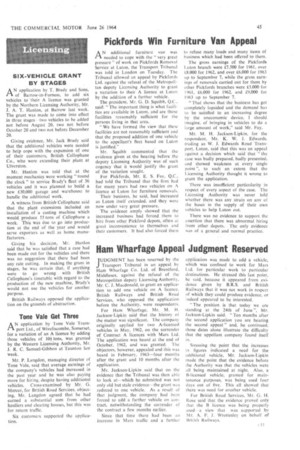Ham Wharfage Appeal Judgment Reserved
Page 47

If you've noticed an error in this article please click here to report it so we can fix it.
• JUDGMENT has been reserved by the Transport Tribunal in an appeal by Ham Wharfage Co. Ltd. of Brentford. Middlesex, against the refusal of the Metropolitan deputy Licensing Authority, Mr. C. J. Macdonald, to grant an application to add one vehicle on A licence. British Railways and British Road Services, who opposed the application before the Authority, were respondents.
For Ham Wharfage, Mr. M. H. Jackson-Lipkin said that the history of the matter was significant. The company originally applied for two A-licensed vehicles in May, 1962, on the surrender of Contract A licences with Mars Ltd. The application was heard at the end of October, 1962, and was granted. The objectors, however, appealed and this was heard in February, 1963—four months after the grant and 10 months after the application.
Mr. Jackson-Lipkin said that on the evidence that the Tribunal was then able to look at—which he submitted was nut only old but stale evidence-the grant was reduced to one vehicle. As a result of that judgment, the company had been forced to add a further vehicle on contract, notwithstanding the surrender of the contract a few months earlier.
Since that time there had been an increase in Mars traffic and a further application was made to add a vehicle, which was confined to work for Mars Ltd. for particular work to particular destinations. He stressed this last point, he said, because it appeared from evidence given by B.R.S. and British Railways that it was not work in respect of which they could produce evidence, or indeed appeared to be interested.
"The position is that today we are standing at the 24th of June ", Mr. Jackson-Lipkin said. "Ten months after the second application you are hearing the second appeal" and, he continued, those dates alone illustrate the difficulty that the appellant company found itself in.
Stressing the point that the increases in figures indicated a need for the additional vehicle, Mr. Jackson-Lipkin made the point that the evidence before the Authority was that the vehicles were all being maintained at night. Also, a B-licensed vehicle, granted for maintenance purposes, was being used four days out of five. This all showed that there was need for another vehicle.
For British Road Services, Mr. G. H. Rose said that the evidence proved only that the 13 licence was being properly used—a view that was supported by Mr. A. F. J. Wrottesley on behalf of British Railways.




























































































































